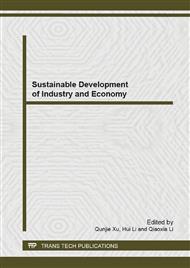p.517
p.522
p.526
p.533
p.537
p.541
p.545
p.549
p.554
Forecasting of Energy Consumption of Beijing's Residential Sector Based on System Dynamics Model
Abstract:
Beijing is a major municipality/province of energy consumption, but poor in energy resources. The inherent and complete dependence on importing energy makes energy security extremely difficult, which draws more attention to the energy conservation in Beijing. With the improvement of people's living standard, the proportion of the residential energy consumption continuously increased. Residential energy saving became the key field of energy conservation and environmental protection. A great many factors of which the relations are complex affect the energy conservation. By introducing System Dynamics analysis, which has a unique advantage of analyzing the multiple and complex feedback system, this paper aims to analyze energy consumption of Beijings residential sector and finally comes to some suggestions towards governments policies.
Info:
Periodical:
Pages:
537-540
Citation:
Online since:
December 2013
Authors:
Price:
Сopyright:
© 2014 Trans Tech Publications Ltd. All Rights Reserved
Share:
Citation:


